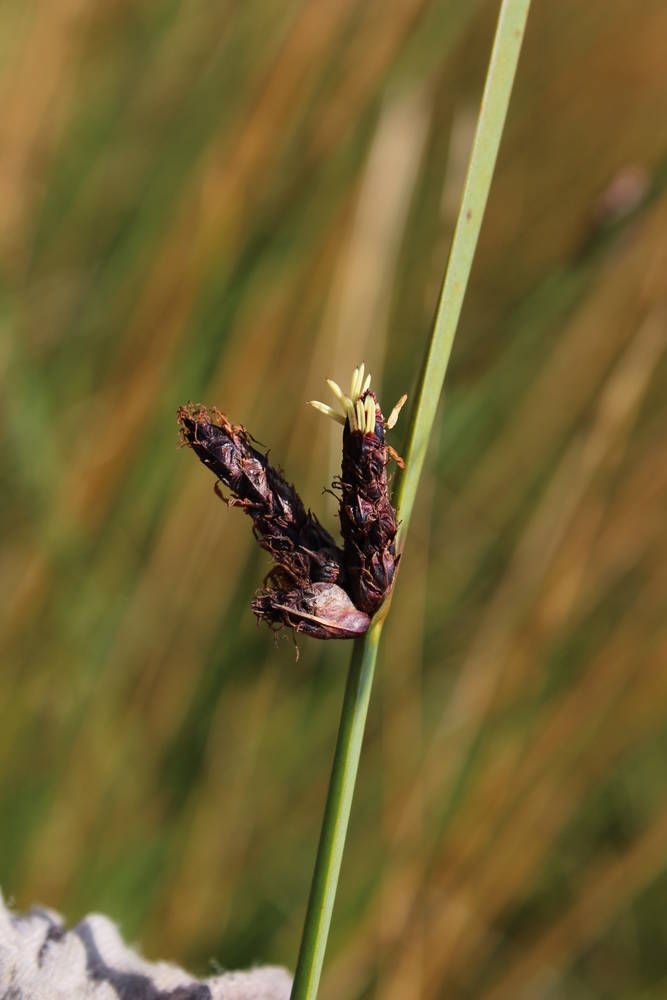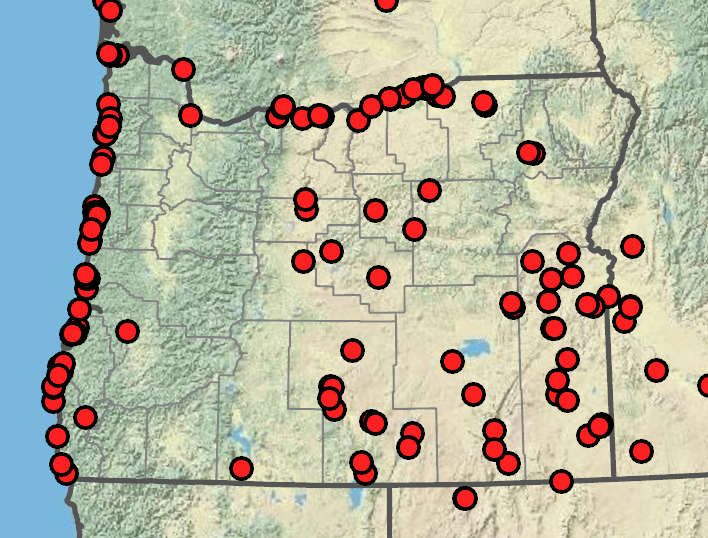Schoenoplectus pungens
Schoenoplectus triqueter
common three-square, common three-square bulrush, western bulrush
streambank bulrush, triangular clubrush
often vertical, 1–6 mm thick.
1.5–5 mm thick.
sharply trigonous;
sides convex to concave proximally, deeply concave to flat distally, 10–200 cm × 1–6 mm.
sharply trigonous, 50–150 cm × 2–4 mm.
proximally V-shaped, distally trigonous to asymmetrically laterally flattened in cross section;
distal blade (1)2–5 times as long as sheath, 50–750 × 2–9 mm.
thickly V-shaped in cross section; shorter than to equaling sheath length.
proximal bract usually erect, resembling leaf blade but trigonous proximally; (1)3–20 cm.
proximal bract usually erect, trigonous, 2–7 cm.
1–5(10), sessile, 5–23 × 3–5(7) mm; floral scales bright (to very dark) orange-, red-brown, or purplish brown to straw-colored, often with prominent linear dots;
midrib mostly paler; ovate, 3.5–6 × 2–3 mm; smooth or awn sparsely spinulose;
margins deciduously ciliolate;
apex acute (to obtuse); notch (0.3)0.5–1 mm deep; awn mostly irregularly bent, 0.5–1.5(2.5) mm.
1–35; in clusters or solitary; clusters sessile or on branches to 4 cm long;
spikes 5–12 × 3–4 mm; floral scales ovate, 3–3.5 × 2.5 mm; straw-colored to orange-brown or midrib greenish, usually with linear spots;
midrib proximally long-scabrous;
apex acute to rounded; notch 0.3 mm deep; awn 0.3 mm, sparsely long-scabrous.
perianth members 4–8, sometimes fewer; bristle-like; equal or unequal; all equaling achene body to all rudimentary, retrorsely spinulose, brown;
stigmas 2–3.
perianth members 4–6; bristle-like, equaling to less than 50% of achene body, retrorsely spinulose, brown;
stigmas 2.
biconvex to compressed bluntly trigonous; (2)2.5–3.5 × 1.3–2.3 mm;
beak 0.1–0.5 mm.
biconvex, 2–2.5 × 1.5–2 mm;
beak 0.1–0.2 mm.
=74, 78.
=42.
Schoenoplectus pungens
Schoenoplectus triqueter
Freshwater to brackish marshes, lake shores, and fens, often emergent in shallow water. 0–2000 m. BR, BW, Col, CR, ECas, Est, Lava, Owy, Sisk. CA, ID, NV, WA; north to AK, throughout US and southern Canada, south to Mexico; South America; Australia, Europe, New Zealand. Native.
Schoenoplectus pungens and S. americanus share the oxymoronic and yet oddly descriptive common name “Three-square.” Their culms are triangular with prominent angles and the inflorescences are sessile. Schoenoplectus pungens shows considerable variation and has been divided into controversially delimited varieties. The group needs more research.
Freshwater tidal shores, marshes. 0–50 m. CR. WA; Eurasia. Exotic.
Although it has triangular culms, S. triqueter is most closely related to S. tabernaemontani. The two produce fertile hybrids, (S. × kuekenthalianus) where they occur sympatrically along the lower Columbia River.
Barbara Wilson, Richard Brainerd, Nick Otting
Barbara Wilson, Richard Brainerd, Nick Otting
- Local floras:
BC,
OR,
WA
- Local Web sites:
Flora NW,
PNW Herbaria
WildflowerSearch
iNaturalist (observations)
USDA Plants Database
- LBJ Wildflower Center
- SEINet
- Plants of the World Online
- Encyclopedia of Life
- Wikipedia
- Google Image Search
- Local floras:
BC,
CA,
OR,
WA
- Local Web sites:
CalFlora,
CalPhotos,
Flora NW,
PNW Herbaria
WildflowerSearch
iNaturalist (observations)
USDA Plants Database
- LBJ Wildflower Center
- SEINet
- Plants of the World Online
- Encyclopedia of Life
- Wikipedia
- Google Image Search




